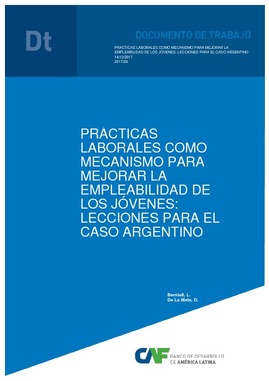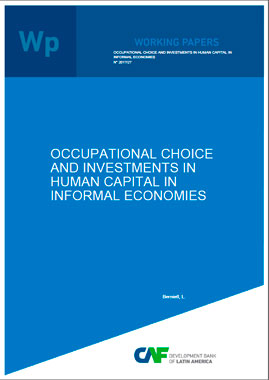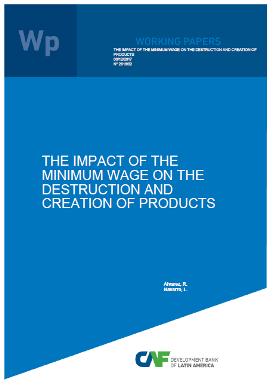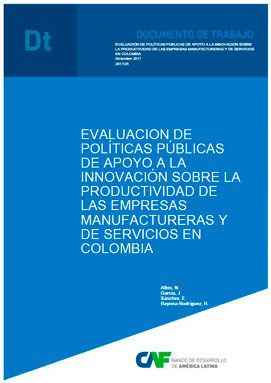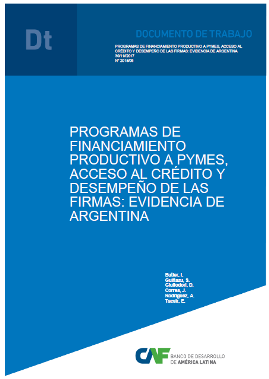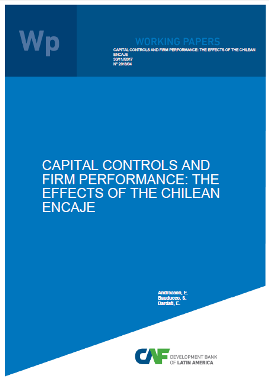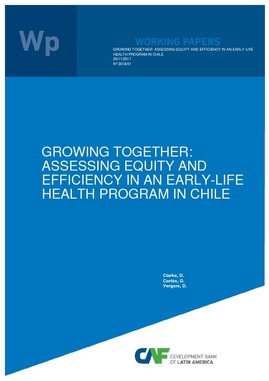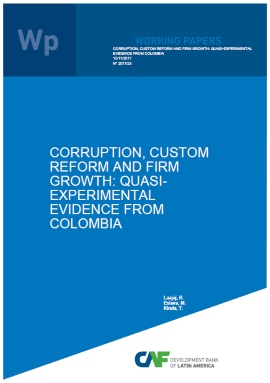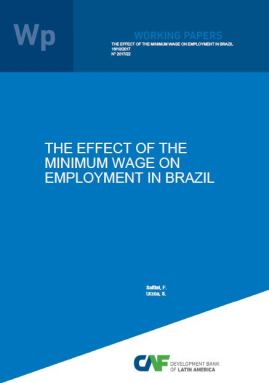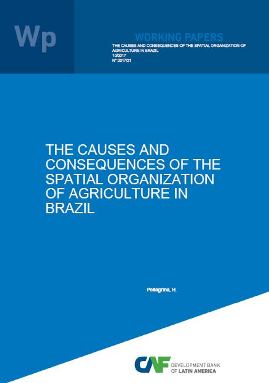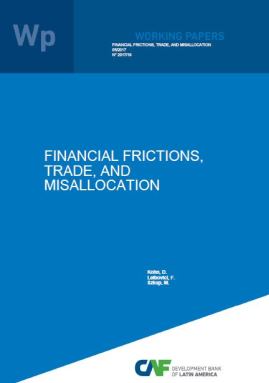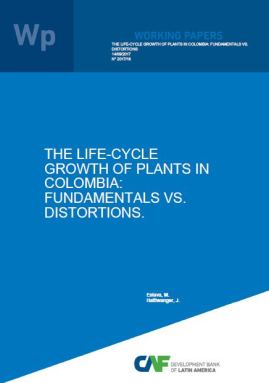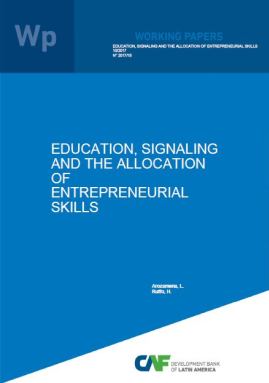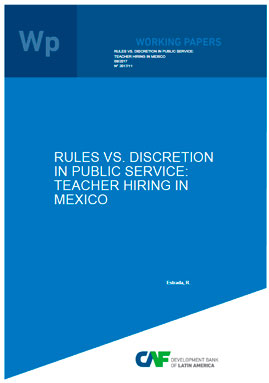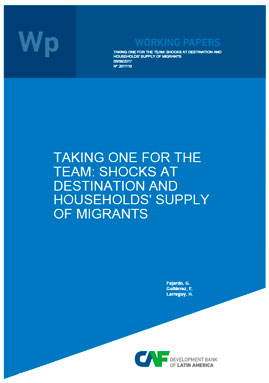6.1 Documentos de trabajo en investigación socioeconómica: Envíos recientes
Mostrando ítems 121-140 de 262
-
Determinants of Slum Formation: The Role of Local Politics and Policies
(CAF; Caracas, 2018-01)One-third of the developing world’s population lives in urban slums and the absolute number of slum residents grew from 650 million in 1990 to 863 million in 2012. Although negative impacts of slum living conditions on ... -
Prácticas laborales como mecanismo para mejorar la empleabilidad de los jóvenes: Lecciones para el caso argentino
(CAF; Buenos Aires, 2017-12-14)El desempleo y la informalidad son más altos para los jóvenes que para los adultos. Las causas detrás de este problema se relacionan con las barreras al primer acceso al mercado del trabajo y pueden clasificarse en dos ... -
Occupational Choice and Investments in Human Capital in Informal Economies
(CAF; Argentina, 2017-12-12)Countries di er greatly in their levels of schooling and also in their rates of entrepreneurship. At the same time, the share of the so-called \shadow economy" -informal economic activities- is very large in some countries ... -
The impact of the minimum wage on the destruction and creation of products
(CAF; Santiago de Chile, 2017-12-06)We study the impact of changes in the legal minimum wage on the creation and destruction of products at the firm level. This can be a relevant way for increasing firm productivity and for explaining why the raises in the ... -
Starting on the right track? The effects of rst job experience on short and long term labor market outcomes
(CAF; Buenos Aires, 2017-12-04)For young job seekers barriers to labor market entry are high, especially in developing countries were information frictions are large. Can first job experience impact such barriers and have perdurable effects? This paper ... -
Evaluación de políticas públicas de apoyo a la innovación sobre la productividad de las empresas manufactureras y de servicios en Colombia
(CAF; Caracas, 2017-12-01)La presente investigación tiene como objetivo analizar el efecto de los instrumentos de apoyo público a la innovación sobre el desempeño productivo y la inversión en innovación de las empresas manufactureras y de servicios ... -
Programas de Financiamiento Productivo a pymes, acceso al crédito y desempeño de las firmas: Evidencia de Argentina
(CAF; Buenos Aires, 2017-11-30)En Argentina se han implementado, en los últimos años, un importante abanico de políticas de financiamiento público hacia las micro, pequeñas y medianas empresas. Sin embargo, hasta el momento, no se han realizado trabajos ... -
Capital Controls and Firm Performance: The Effects of the Chilean Encaje
(CAF; Santiago de Chile, 2017-11-30)This paper studies the effects of the capital controls imposed by Chile between 1991 and 1998, i.e. the Chilean encaje, on firms' production, investment and exporting decisions. We use a general equilibrium model with ... -
Growing Together: Assessing Equity and Effciency in an Early-Life Health Program in Chile
(CAF; Santiago de Chile, 2017-11-20)We estimate the impact of participation in Chile Crece Contigo (ChCC), Chile’s flagship earlylife health and social welfare program, on neonatal health outcomes. We use administrative birth data matched to social benefits ... -
Corruption, Custom Reform and Firm Growth: Quasi-Experimental Evidence from Colombia
(CAF; Buenos Aires, 2017-11-15)Customs are often prone to corruption because it concentrates a lot of discretionary power in the hand of custom agents who take decisions with high economic stakes for the firms, providing an opportunity for custom agents ... -
Poor Little Children: The Socioeconomic Gap in Parental Responses to School Disadvantage
(CAF; Buenos Aires, 2017-11-08)In this paper, we study how parents react to a widely-used school policy that puts some children at a learning disadvantage. Specifically, we first document that, in line with findings in other countries, younger children ... -
Input-output linkages and sector-specific distortions in the Latin American development problem
(CAF; Buenos Aires, 2017-11-03)In this paper, I analyze the Latin American development problem using a model with input-output linkages, sectorial productivity gaps, and sector-specific distortions. I provide a characterization of the sectorial linkages ... -
The Effect of the Minimum Wage on Employment in Brazil
(CAF; Buenos Aires, 2017-10-16)During the economic boom of the early 2000s, most Latin American countries increased their minimum wages. In Brazil, the real minimum wage increased by upwards of 60 percent from 2003 through 2012. In this paper, we take ... -
The Causes and Consequences of the Spatial Organization of Agriculture in Brazil
(CAF; Buenos Aires, 2017-10-10)Why are there vast differences in agricultural activity across space? How do these differences shape the aggregate impact of agricultural shocks? To address these questions, I build a quantitative general equilibrium model ... -
Financial Frictions, Trade, and Misallocation
(CAF; Buenos Aires, 2017-10-07)We investigate the extent to which financial frictions shape the aggregate effects of a trade liberalization through their impact on aggregate total factor productivity (TFP) and capital misallocation. We study a small ... -
The Life-cycle Growth of Plants in Colombia: Fundamentals vs. Distortions
(CAF; Buenos Aires, 2017-10-05)We take advantage of rich microdata on Colombian manufacturing establishments to decompose growth over an establishment’s life cycle into that attributable to fundamental sources of idiosyncratic growth ̶ physical productivity, ... -
Education, signaling and the allocation of entrepreneurial skills
(CAF; Buenos Aires, 2017-10-02)We assess the allocative importance of education when workers can choose to self-employ. To do so, we build a model combining educational choices with the labor market and selfemployment. Education can increase workers' ... -
What explains output recoveries in developing and emerging market economies after the global financial crisis?
(CAF; Buenos Aires, 2017-09-26)This paper presents a systematic assessment of the macroeconomic factors associated with differences in GDP dynamics in emerging markets in the aftermath of the global financial crisis. We implement a Bayesian Model ... -
Rules vs. Discretion in Public Service: Teacher Hiring in Mexico
(CAF; Buenos Aires, 2017-08-18)In this paper, I use a unique empirical setting that allows me to compare the performance of teachers hired in a discretionary process led by the teachers’ union in Mexico with the performance of those hired on the basis ... -
Taking One for the Team: Shocks at Destination and Households' Supply of Migrants
(CAF; Buenos Aires, 2017-08-9)We study how unemployment shocks in the United States affect Mexican households’ migration decisions. We emphasize households at origin (as op-posed to individuals) as the decisionmaking units for migration decisions. We ...



